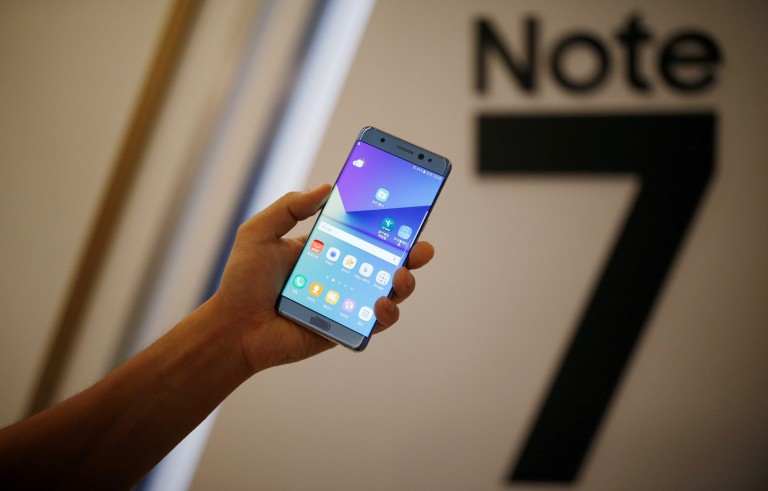(单词翻译:单击)
HARI SREENIVASAN: It's an eventful day and a humbling one for the electronic giant Samsung, the world's largest maker of smartphones.
Today, the company announced that it is halting production of its beleaguered Galaxy Note 7 phone. Reports of the Note 7 catching fire caused the company to issue a recall and then create replacement devices that were also found to be a fire risk.
It comes, coincidentally, as a prolonged battle between Apple and Samsung over money, patents and the designs of those phones you use went before the U.S. Supreme Court today.
Jessi Hempel is with Backchannel, a Web-based platform that covers the tech world. She joins us now.
So, tell us a little bit about the issues surrounding this. We have seen dribs and drabs of people saying, look at this burned-out battery, look at this burned-out shell. How long has this been going on? How serious it is?
JESSI HEMPEL, Backchannel: Well, it's quite serious.
I mean, it's really impossible to underestimate how serious this is for Samsung. It's been a month-and-a-half. You know, at first, when the phones started catching fire, Samsung acted decisively and immediately and got a lot of credit for that. It said, we issued a recall. People went and returned their phones.
And then the new phones started catching fire. And that's when it became a very serious problem for Samsung. It suggests that we really can't trust the brand. And, frankly, when people think about this, yes, maybe they will remember that it's the Samsung Galaxy Note 7, or maybe they will just think about the brand name Samsung.
HARI SREENIVASAN: Right. And that's a big company. They make everything from washers and dryers to lots of other bigger things.
JESSI HEMPEL: Yes. Right.
HARI SREENIVASAN: But how important is this? This is sort of the flagship phone, the thing they're supposed to be the most proud of.
JESSI HEMPEL: This is their flagship phone. And, therefore, it's really important. And it's important for a couple reasons.
First off, this was what they put forward to compete with Apple's new iPhone. And, quite frankly, it didn't work. It will be a huge financial loss for the company. Now, it's hard to say exactly how much, and it will be a while before we know, but I have seen estimates put it at between $4 and $5 billion. So it's very important.
HARI SREENIVASAN: All right, so, speaking of Apple, they're in the Supreme Court today, the arguments.
JESSI HEMPEL: Right.

HARI SREENIVASAN: What's the sort of core of the disagreement between Apple and Samsung?
JESSI HEMPEL: You know, anybody who has watched Samsung and Apple over the last five years has seen this play out in ticktock, this ongoing fight between Samsung and Apple.
What's at issue today is no longer the question of, did Samsung copy Apple? Yes, everyone has agreed Samsung has copied Apple. It's no longer the question of, should Samsung pay Apple? Yes, the courts have agreed. Samsung already paid Apple. What is at question now is, how much money does Samsung really owe Apple?
Now, the courts, the federal courts in California said, according to the law, Samsung owed the total profit on the phones that it ripped off pieces of the design from Apple. Samsung at this point is saying, no, wait, hold on a minute, why should we pay total profit? You're raising an objection over three design elements on this phone. Surely, we shouldn't have to pay the total profit for the phone just over three design elements.
HARI SREENIVASAN: So, this is really just about deciding how much money either Apple will continue to keep or if it would have to give it back?
JESSI HEMPEL: That's right.
And, you know, the reason why this matters, the reason why the Supreme Court would even decide to look at this right now is because it raises the question and the importance of design to a product. And that, of course, is a big issue for Silicon Valley write large.
And it's been a very long time, I think 130 years, since the courts took up this issue of patent, of design patent. It gets to the question of, what is core to a product? What differentiates it in the market?
And, you know, it's funny. These three design elements, each on their own, they just don't seem that big. There's the question of the rectangle shape of the face of the phone. There's the question of the raised glass on the front of the phone, and then there's the question of the icons on the front of the phone.
Now, if you think about all these things, right, they have become central to what we think of as not just an iPhone at this point, but a smartphone. Apple says, hey, we get credit for that. We designed those. We own those. And you owe us all the money off of the phones that you sold that ripped those off.
Samsung says, well, wait a minute, you know, parallel to this is like a car and a cup holder in the car. Would you say that if I ripped off the design of a cup holder in the car, that I should pay you the total profits on the entire car? Is that what differentiates it to the consumer?
HARI SREENIVASAN: Jessi Hempel from Backchannel, thanks so much.
JESSI HEMPEL: Thank you.


